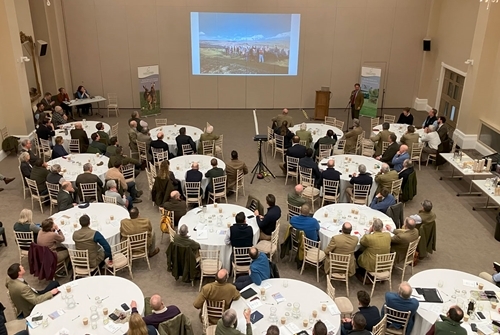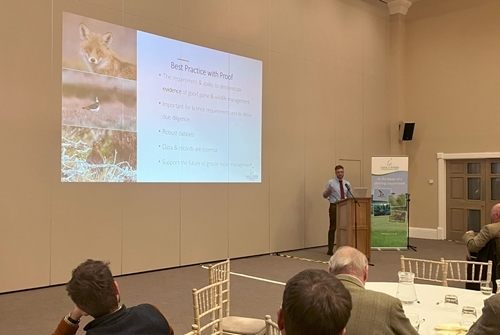Former Defra minister and GWCT Chairman Sir Jim Paice set out the theme of the Trust’s annual game management conference, Game 24, in Leyburn, North Yorkshire, by making clear the risks for the shooting community of stalling on self-regulation. He said: “When people complain that shooting is totally unregulated, government needs to be able to say it has proof that it has its house in order, otherwise regulation will follow, as sure as night follows day. Game shooting does so much good for the countryside and UK biodiversity and it’s vital we have the evidence to prove it. That’s why voluntary accreditation in the form of initiatives like Aim to Sustain’s new Game Assurance Scheme are so important. We need shoots to sign up across the board.”
In his presentation to delegates, GWCT Director of Advisory Dr Roger Draycott used the powerful example of processing licences for gamebird releasing on designated sites. “Defra asked the GWCT to advise on individual licence applications in the wake of last year’s changes to GL43 and it was much easier to make the case for shoots that could prove they complied with GWCT Principles of Sustainable Game Management and the other codes of practice covering the industry.”

This point was reinforced by Bernard Moss, Headkeeper at Farndale shoot in North Yorkshire, and chair of the North Yorkshire Moors Shooting Alliance. Releasing was restricted at Farndale in 2010 following a legal challenge from Natural England. In taking on the management, Bernard had to a maintain a viable commercial shoot, while ensuring the recovery of protected sites. Not content with achieving sufficient recovery for releasing to be reinstated by Natural England, he asked the GWCT to carry out a shoot biodiversity assessment in 2019.
He said: “When Roger Draycott visited, he was able to confirm that Farndale met the GWCT guidelines for sustainable releasing and was delivering a significant biodiversity net gain. All our pens are within 500 yards of designated sites so we would effectively have been closed down last year had we not worked hard to meet those standards. There is no way we could have made enough changes to meet the individual licence criteria in a single season, but we had a ten-year head start. I would urge all shoots, regardless of whether you are near a designated site, to get ahead of the game and get accredited as soon as possible.”
The Game Farmers’ Associations PR and Political Advisor and Game Sector Representative at the government’s National Avian Disease Core Group (Avian Influenza), Dominic Boulton, explained that, were the shooting community able to show widespread certification of best practice, it would be far better placed to influence policy decisions on gamebird releasing in the event of another serious avian influenza (AI) outbreak, or a resurgence of the current one. He said: “The supply chain issues of 2022 and other effects of the current outbreak of AI are still being felt throughout the sector, and it’s not sustainable to carry on as if AI doesn’t affect us. We may be doing things right, but we have to be able to demonstrate it. All shoots should join schemes like Aim to Sustain Assurance or Trusted Game, and being on the UK Poultry Register is a legal requirement for any shoot that releases.”
Dan King, Director of Sandhill Vets and Trusted Game, concurred that recent AI outbreaks had put game management under scrutiny. He said: “Never has the shooting sector been under the spotlight as it is currently due to the last few years of AI. This has brought the sectors practices to the forefront of Defra and APHA’s minds and left us open to scrutiny. To survive we absolutely must ensure we run a tight ship and, through self-regulation, demonstrate how the majority of sites already operate to a high standard.”

John Clarke, the National Gamekeepers’ Organisation Director of Conservation, Policy and Uplands, reminded the packed hall that it’s not only shoot owners and managers who must take responsibility, but also individual guns. “We all need to call out bad practice and iron out the simple things our opponents jump on like the correct use of lead shot. It’s especially true in the age of social media when the misdemeanours of a handful of people can be put in front of thousands of people in a matter of seconds, this can do so much damage so quickly.”
Nick Hesford, Head of Advisory GWCT Scotland, explained how modern technology could utilise data in defence of game management by demonstrating best practice and its positive contribution to the countryside. He said: “Without data you are just another person with an opinion. For example, NatureScot is much more likely to issue a licence for predation management if we can show them evidence through a system like EpiCollect. By combining IT with the knowledge of the people on the ground, we can quickly produce data that would have previously taken years to gather and is very valuable to government. That’s why it’s essential that gamekeepers take part in surveys like the forthcoming one on the use of fox restraints in England. If we can show the sector is complying with codes of practice, it will help secure the retention of these important conservation tools.”
In his closing speech, Chair of Aim to Sustain Ian Coghill summed up the day. He said: “In my 30-year association with GWCT it’s never let me down, and today is a classic example. The information you get at these conferences is quite wonderful. The clear message is that we have to get our act together. It’s difficult because you can divide the world into cavaliers and roundheads and the shooting community tend to be cavaliers, but we need to move to a position where we can still enjoy ourselves while demonstrating beyond doubt that everything is beyond reproach and for the greater good of the countryside. Anecdotes are good, facts are better, data is better than that, and science is the thing you need.”
Feedback from the conference was overwhelmingly positive, with delegates enjoying the chance to meet colleagues and friends in the game management community and discuss the burning issues.
Charlotte Marrison, who manages the Raby Estate in Shropshire and is also the county’s GWCT chair, praised the speakers for successfully highlighting how crucial it was for shoots to sign up to the Aim to Sustain Game Assurance Scheme. “There are still many, many shoots that haven't taken part yet and need to. We’ve got to make sure that all shoots in the country are showing evidence of best practice.”
Another delegate, Will Southall, director of land agent William Powell Sporting, said: “The Game conference is something that we always have in the diary. It's penned in straight away as soon as the date comes out. It’s a really useful update in terms of what’s going on within the industry – a great chance for us all to get together and talk amongst friends and fellow professionals and generally catch up with what’s going on.”